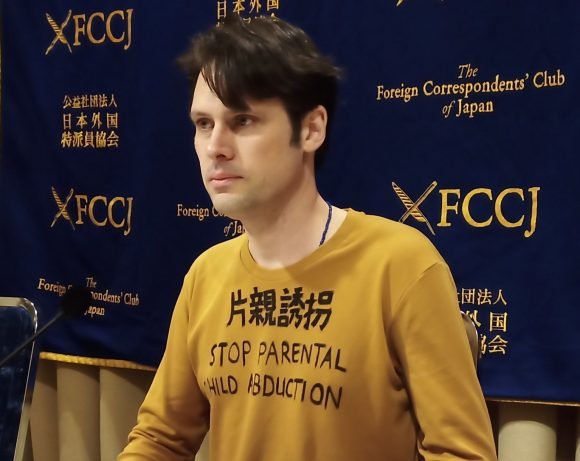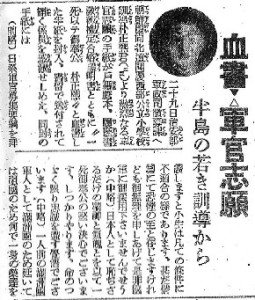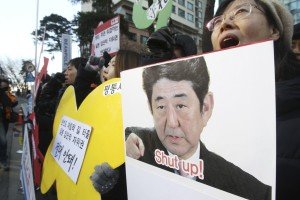Japan’s brutal police state: 45 days in the hole for walking into a lobby
By Fred Varcoe
Prosecutors demanded that Australian Scott McIntyre be imprisoned for six months for walking into a lobby.
Much to their disgust, they had to be satisfied with torturing him for 45 days and giving him a suspended sentence. Because he walked into the lobby of the building where he believed his kidnapped children were being held. Two minutes of parental concern translated into 45 days of life on the chain gang.
Scott’s two children were born in Australia and spent the first half of their lives there. The family moved back to Japan, but Scott and his wife didn’t get along and she started divorce proceedings. The children were 10 and 7 at the time. In May 2019, Scott’s wife disappeared with the children after a visit to their in-laws who lived 100 meters down the street. He was unable to find them or see them. Child abduction is against the law in Japan and runs counter to a United Nations convention that Japan has signed. But in Japan, it’s a regular occurrence and one that rarely gets punished. And one the police don’t want to get involved … unless a foreign dad walks into a lobby.
After a couple of seriously violent typhoons, Scott wanted to make sure his kids were safe, so he went to his in-laws’ apartment building and gained access when a resident came out. He wasn’t able to find out anything about his kids and left the building after a couple of minutes. The police arrested him.
One. Month. Later.
Bad enough, you might think. But it gets much worse.
In a civilized country, the cops might have given Scott a warning. More likely, they wouldn’t have bothered. In fact, in a civilized country, the cops would have gone after the wife for abduction and the in-laws for conspiracy to kidnap children. Remember, the couple were still married and the wife had no right to abduct her children and prevent Scott from seeing them. What if she was a lunatic and child abuser? Apparently, that’s OK, just as long as she’s Japanese and doesn’t walk into a lobby. If you think having your children kidnapped is bad enough, then obviously you haven’t been arrested in Japan for walking into a lobby.
Scott McIntyre held a press conference at the Foreign Correspondents’ Club of Japan after his release. Reuters, the BBC and the Wall Street Journal showed up, but no Japanese media. Which was a shame because he had plenty to say.
The Ghosn treatment
‘I was subjected to the same treatment as Carlos Ghosn was with the use of 24-hour light, which is classified by both the United Nations and Amnesty International as a method of torture. On three separate occasions I asked to make a formal complaint that I was being tortured and I was told that nothing would be done and if I complained further, I would be placed in solitary confinement or a strait jacket. These are not the marks of a modern, civilized nation and also bring shame on the nation of Japan and should be immediately ended, not just for myself but for the 95 percent of detainees and prisoners who are Japanese and who also don’t have a voice in this issue.’
‘I did 45 days detention for a minute of just going into the lobby of my parents-in-law’s apartment to try and see if my children were safe after a natural disaster. I was handcuffed and put in a four-by-three tatami-mat cell. I shared a cell with several murderers, with a rapist, with a pedophile, with a violent armed robber, with various yakuza. This is unusual for someone on a trespassing charge to be put in these kinds of situations.’
‘This is the image that Japan is portraying to the world ahead of hosting the Olympics, that they’re allowing abductions of children to happen and what I believe and what Amnesty International believe is torture for people in detention. Their own people are being tortured in detention. You can understand why if I had $20 million and a private jet and a big drum case, I would be out to Lebanon as well, because why would you want to stay here and suffer under these conditions?’
‘I was not allowed to exercise daily and when I complained about that, I was threatened with isolation and with the strait jacket. In Kosuge, where Carlos Ghosn was held, we were not permitted to stand up in the cell, so you have to sit at a table. You were not allowed to lean against the wall. So that was 23 and a half hours a day of sitting on the floor. You could lie down for a two-hour nap period in the afternoon and you could lie down at night, but during the day you had to remain seated at the desk, and over the nine-day New Year period, there was no exercise. So, for nine days, it was either lying asleep or sitting on the floor either seizan style or with crossed legs on the tatami.’
‘I made three separate complaints about what I explained to them was torture and was not permitted under Amnesty International and U.N. regulations and, as I said before, I was told this is just my opinion that this is Japanese law and this is the way things are done in Japan and if I made any further complaints about it I was threatened with either being placed in an isolation cell or with a strait jacket. I complained about the use of 24-hour light. The lights remained on and it’s impossible to sleep. I haven’t slept properly since November. I was fortunate to only have 45 days. You can only sleep for maybe an hour at a time. What does that do to people mentally? It’s like the night of the Walking Dead. People are walking around like zombies. You can’t have clarity of thought.’
‘I met so many people, other detainees and prisoners, who openly said to me: ‘I didn’t do what they are accusing me of doing but I’ll confess because I’m told if I confess, I’ll get half the sentence. If I fight it, I’ll get 10 years. If I confess, I’ll get five years.’ As Carlos Ghosn mentioned in his press conference, Japan has a conviction rate of 99.4 percent. This is not normal. This is not normal in any country.’
‘Japan uses this as a way of showing how safe and how efficient their system is, but I know from my experience, because I was told directly by so many inmates, ‘We didn’t do what they said we did but we’re confessing just to get out and we were told by prosecutors if we confess we will get a substantially lower sentence.’ This I was told directly by multiple prisoners that I was being held with. During the interviews I had – I think it was three interviews with the police and three or four with the prosecutors – at not one of those interviews was a lawyer present at any point in time, which I think is also an accepted practice.’
The chain gang
Both inside and outside the detention center, things weren’t going well for Scott. ‘When you’re moved, you’re moved in handcuffs and you’re tethered with rope to other prisoners, anywhere up to a dozen other prisoners. This is unacceptable, but it’s certainly not acceptable for a father who is trying to ascertain if his children are alive or dead.’
Not content with messing up his life, the police were also complicit in messing up his apartment.
‘Three days after I was detained, I managed to pass the key to my apartment to a friend of mine. When she opened the door of the apartment, the apartment was completely trashed. There was rubbish and garbage all over the floor and multiple items had been removed from the house. She went back two days later and everything was gone. All of my children’s belongings were removed from the house, my children’s books, their desks, their chairs, their toys. All of their photographs were gone, boxes containing little memories of them were all gone, the vast majority of my property was gone. I’ve managed to borrow a suit from a friend and bought a T-shirt from UniQlo, but outside of this I have almost nothing. The fridge was taken, the washing machine was taken, the television was taken. Almost all of my property was taken from my apartment.’
‘I don’t know who came into my apartment but there’s only two people that had a key to that apartment, me and my wife, and there was no sign of forced entry. Someone came into my apartment three days after I was detained and I want to know how they knew I was detained. Who from the police is informing people that I was detained? I made a complaint immediately to the police that everything had been removed from my apartment and I want to make a complaint of theft. I was told they would do nothing. My children were taken, my children’s memories were taken and now everything has been taken from me.’
It’s a family affair
‘So, now this ordeal for me is over but it’s not over for the children. I have to start again. I have nothing. And this all for trying to find my children who were taken from me against my will. I was told we won’t do anything for you; this is a simple family matter and simple family dispute. So, if it’s a simple family matter and simple family dispute, why, when I go to the apartment of the parents-in-law who are family, why am I arrested? Why are they supporting one element of the family but they are not supporting the other element of the family? Things are not equal, things are not just and as you know, as with so many parents, we go to the police. I went with a copy of the law. ‘This is the law of Japan, you must investigate.’ They said, ‘Go away. We will not investigate. I went more than a dozen times. It’s not acceptable. The police are obliged to investigate.’
‘What I would like to see the police do is put in the amount of effort they put in to investigating a two-minute trespassing in which I didn’t talk to anybody, I didn’t touch anything, I didn’t damage anything. I went in to look if my children’s umbrellas or shoes were there and I immediately left. It was no more than one or two minutes. The amount of effort they put into that they could have put the same amount of effort and work into investigating the claims I’d made of kidnapping and abduction but which they refused. What I want them to do now is to investigate equally the theft and removal of all of my children’s and my property from my apartment. It’s now time for the police to show they treat everybody fairly and equally. If they are going to investigate trespassing, then I want them to investigate why 90 percent of the things from my house were removed.’
‘In many cases in my experience in Japan, children are viewed almost not as a human. In this case, they are almost viewed as a marital asset, as property to be removed and distributed. In Japan, as soon as divorce is finalized, one of the parents is removed from the family register. You’re obliterated. You’re not longer a parent. If the parent remarries, the new partner has the chance to officially become a father or mother of your children and you have no rights. It’s not normal in most countries and this is why we keep coming back to the same thing – just change the law to joint custody. We want the family court to move things quickly. It’s not good enough – nine months on average for someone to see their children. It’s not good enough for 70 percent of parents to never, ever, for the rest of their life, see their children. It’s an abuse. It’s a human rights abuse against children, 100,000 children a year, and in my opinion, it’s one of the biggest human rights abuses anywhere on the planet that 100,000 children are being denied basic fundamental human rights by multiple organs of the Japanese state.’
The dehumanizers
It should be completely embarrassing for Japan to have a Wikipedia page titled ‘International child abduction in Japan,’ and for there to be websites such as bachome.org and japanchildabduction.org dedicated to child kidnappings in Japan. Japan was horrified by the abduction of its citizens by North Korea, but it seems to have no qualms about its own citizens stealing children. The United States put Japan on a blacklist of countries showing non-compliance with the Hague Convention on parental abduction. It removed Japan from its blacklist in the same month that Scott McIntyre’s wife kidnapped his children, despite State Department concerns ‘about both the lack of effective mechanisms for the enforcement of Convention orders and the sizable number of pre-Convention abduction cases.’ The move was criticized by U.S. Rep. Chris Smith, who stated: ‘It cannot be denied that the Japanese government has done little to help reunite those American children who have been separated from their left-behind parents.’
The police state of Japan fits right in with Prime Minister Shinzo Abe’s desire to relive the glories of its militarist past. The wartime and pre-war military ‘thought police,’ the Kempeitai, struck fear into the hearts of Japan’s ordinary men and women. The current judicial system, including its police and prosecutors, aims to do the same. It’s ironic that the West tried to dehumanize the Japanese for their savagery during the Pacific War, when in fact the Japanese – led by the Japanese state – are perfectly capable of dehumanizing themselves.





